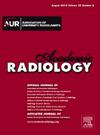用于区分支气管腺瘤和早期肺腺癌的术前 CT 和放射omics Nomogram。
IF 3.8
2区 医学
Q1 RADIOLOGY, NUCLEAR MEDICINE & MEDICAL IMAGING
引用次数: 0
摘要
材料与方法在这项回顾性研究中,我们分析了在本院接受治疗并经病理证实患有支气管腺瘤(BA)或早期肺腺癌(LUAD)的 226 名患者的数据。患者被随机分为训练组(158 人)和测试组(68 人)。所有 CT 图像均由两名放射科医生使用传统计算机断层扫描进行独立分析和测量。采用逻辑回归法确定临床预测因素。多变量逻辑回归分析用于构建 BA 和早期 LUAD 的差异诊断模型,包括传统 CT 模型和放射组学模型。结果肿块形状、肿瘤-肺界面和胸膜回缩征被确定为独立的临床预测因素。CT提名图、放射学特征和放射学提名图的曲线下面积分别为0.854、0.769和0.901。CT 提名图和放射组学提名图在区分两种实体方面都表现出良好的普适性。结论 这两个术前提名图在区分 BA 患者和早期 LUAD 患者方面具有重要价值,有助于做出明智的临床治疗决策。本文章由计算机程序翻译,如有差异,请以英文原文为准。
Preoperative CT and Radiomics Nomograms for Distinguishing Bronchiolar Adenoma and Early-Stage Lung Adenocarcinoma.
RATIONALE AND OBJECTIVES
Evaluating the capability of CT nomograms and CT-based radiomics nomograms to differentiate between Bronchiolar Adenoma (BA) and Early-stage Lung Adenocarcinoma (LUAD).
MATERIALS AND METHODS
In this retrospective study; we analyzed data from 226 patients who were treated at our institution and pathologically confirmed to have either BA or Early-stage LUAD. Patients were randomly divided into a training cohort (n=158) and a testing cohort (n=68). All CT images were independently analyzed and measured by two radiologists using conventional computed tomography. Clinical predictive factors were identified using logistic regression. Multivariable logistic regression analysis was used to construct differential diagnostic models for BA and early-stage LUAD, including traditional CT and radiomics models. The performance of the models was determined based on the area under the receiver operating characteristic curve, discrimination ability, and decision curve analysis (DCA).
RESULTS
Lesion shape, tumor-lung interface, and pleural retraction signs were identified as independent clinical predictors. The areas under the curve for the CT nomogram, radiomic features, and radiomics nomogram were 0.854, 0.769, and 0.901, respectively. Both the CT nomogram and the radiomics nomogram demonstrated good generalizability in distinguishing between the two entities. DCA indicated that the nomograms achieved a higher net benefit compared to the use of radiomic features alone.
CONCLUSION
The two preoperative nomograms hold significant value in differentiating between patients with BA and those with Early-stage LUAD, and they contribute to informed clinical treatment decision-making.
求助全文
通过发布文献求助,成功后即可免费获取论文全文。
去求助
来源期刊

Academic Radiology
医学-核医学
CiteScore
7.60
自引率
10.40%
发文量
432
审稿时长
18 days
期刊介绍:
Academic Radiology publishes original reports of clinical and laboratory investigations in diagnostic imaging, the diagnostic use of radioactive isotopes, computed tomography, positron emission tomography, magnetic resonance imaging, ultrasound, digital subtraction angiography, image-guided interventions and related techniques. It also includes brief technical reports describing original observations, techniques, and instrumental developments; state-of-the-art reports on clinical issues, new technology and other topics of current medical importance; meta-analyses; scientific studies and opinions on radiologic education; and letters to the Editor.
 求助内容:
求助内容: 应助结果提醒方式:
应助结果提醒方式:


